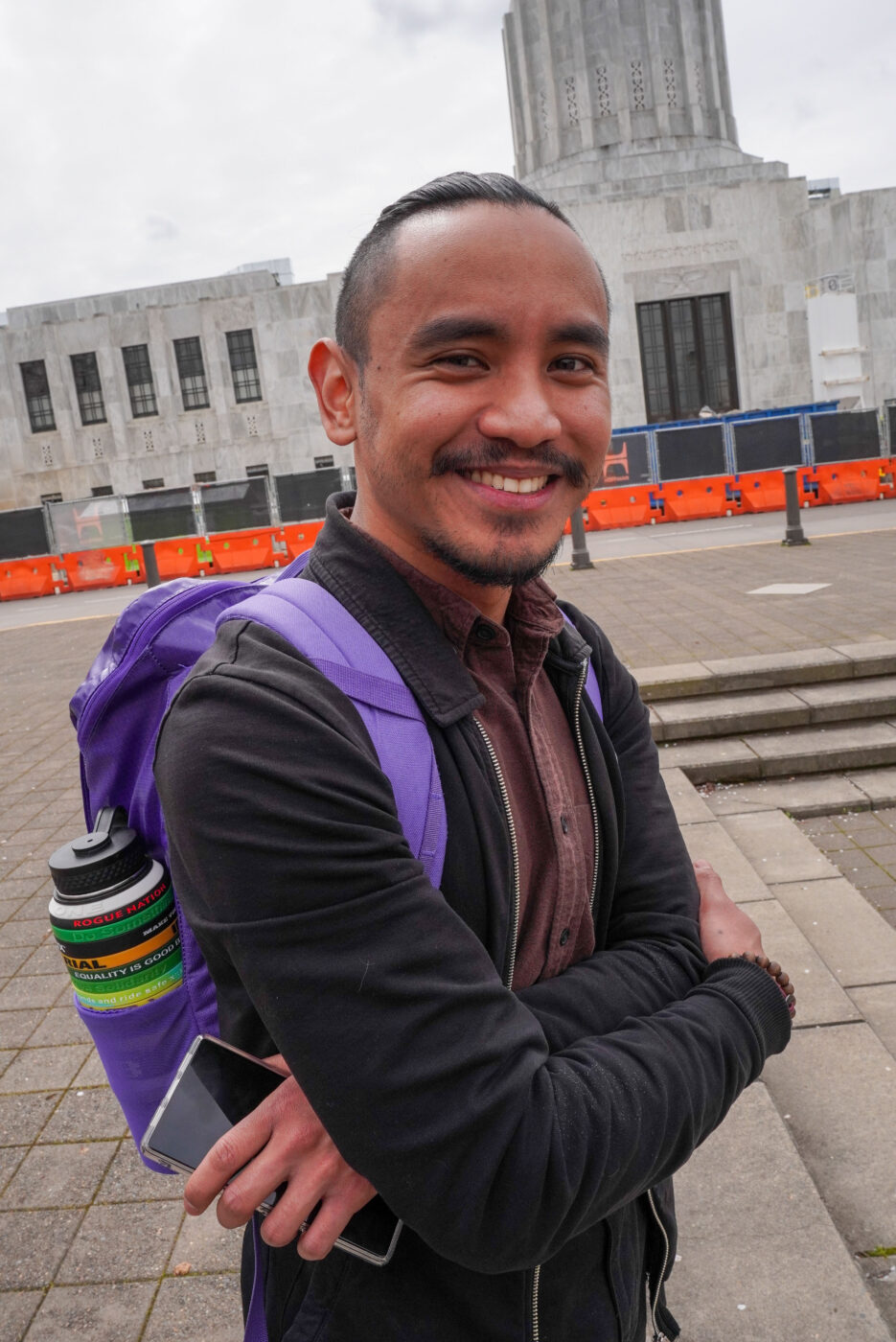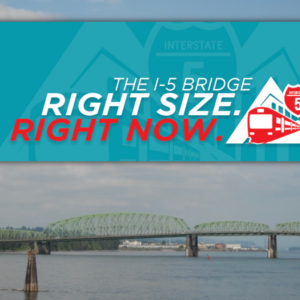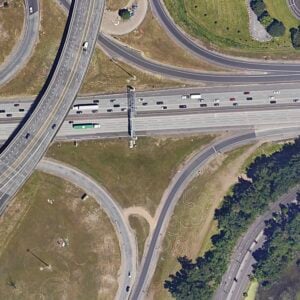Last week we went down to Salem to cover the Transportation Future Day of Action lobby day. It was an event organized by Just Crossing Alliance as part of their “Right Size, Right Now” campaign that seeks to re-orient the trajectory of the Interstate Bridge Replacement Program project.
As we reported in our recap filed from the State Capitol Thursday, people from across Oregon came to Salem to connect with other advocates and talk with their elected representatives. As the day unfolded, I tracked down several people and asked them to share why they showed up at the event, what their vision is for the project, and if they felt the lobbying had an impact. I also got to talk with Oregon House representatives Khanh Pham (D-Portland) and Mark Gamba (D-Milwaukie).
Below are excerpts from those conversations and a full transcript of the episode:
Khanh Pham, Oregon House rep:
“My vision is that legislators understand the choice that’s at stake here. Sometimes we’re seeing this presented with this choice in isolation, it’s either do this or we kill the bridge, and I hope they see that there are many more choices… This is a billion dollar, once in a generation investment we’re making and we need to have robust public engagement to make sure that this investment is really aligning with the priorities of the people of Oregon.”
Aaron Brown, aide to Rep. Pham:
“In my years of advocacy, I don’t think until I had worked in the state legislature that I fully understood how much Salem, in this building right here we’re walking by, has enormous clout and power over the direction of ODOT… It feels very empowering to bring people into the government building where all these decisions are made and to just have a presence and to be actively getting to talk to the people that every other year for a couple weeks decide how the state transportation funding is going to go down.”
Adah Crandall, Sunrise PDX
“I think it’s really important that we’re engaging legislators from all sides of the political spectrum because this is an investment that is being made by the full state and affects the whole state. There are a lot of different reasons that we need a right-sized Interstate Bridge, and not all of them are the really lefty climate reasons. There are a lot of points that do appeal to these Republican lawmakers who care about fiscal responsibility.”
Zachary Lauritzen, interim executive director Oregon Walks:
“I think that people are recognizing if you start spending literally hundreds of millions, likely billions, of dollars of general fund money on one project so that people from Washington can skip down to shop tax-free in Oregon — that that does not meet the needs of their constituents. So I feel like once [legislators] hear that and they understand that’s what the trade-offs are, that we are going to build this coalition.”
Josh Laurente, OPAL Environmental Justice Oregon:
“When I reflect on the history of this bridge, specifically the indigenous people who were uprooted to build this bridge, Black neighborhoods paved over to connect it to the highway, and frontline communities who are surviving toxic air pollution from the freeway, and when I think about that history and the need to replace this bridge now I am reminded of our collective responsibility to be good stewards of this land and of public dollars. Oftentimes, I was the youngest person in the room talking with these legislators, and I had to make sure that they knew that younger people are wise to the climate crisis and are making choices like choosing public and active transit, and so we really want to make sure that this bridge respects and honors that by making sure that that is front and center in the design of this bridge and not just a side piece that can be discarded later.”
Mark Gamba, Oregon House rep:
“It’s interesting to me that so many folks working in this building don’t have a clear understanding of how we fund transportation in this state and how limited and lopsided it is and that it really is going to be a big hurdle to begin to reduce our climate impacts from a transportation standpoint.”
Listen to the full episode in the player above or wherever you get your podcasts. If you liked this episode, subscribe and browse our archives for past shows, leave us a review on Apple Podcasts, and tell your friends about it. BikePortland is a community media source that relies on individual subscribers to stay in business. Please sign up today if you aren’t a subscriber already.







Thanks for reading.
BikePortland has served this community with independent community journalism since 2005. We rely on subscriptions from readers like you to survive. Your financial support is vital in keeping this valuable resource alive and well.
Please subscribe today to strengthen and expand our work.
I listened to the podcast and I thought it was great. Mark Gamba had the most interesting comments, I thought. He seemed to be saying that our transportation system is so heavily weighted toward providing infrastructure for personal cars and trucks that everything else gets just the leftover crumbs.
So how will we get the systemic change we need? Gamba said something about a big review of transportation policy in 2025. I hope BP can delve into this effort in the near future and tell us what it’s all about.
Followed, of course, by many years of listening sessions and stakeholder committees.
Let’s be real. These establishment-oriented politicians and political operatives have the sense of urgency of a three toed sloth [endangered].
That reference to 2025 was far from a nothing-burger. Gamba, Pham, and everyone else at the Capitol are laying groundwork for what everyone agrees will be a push for another massive transportation spending package in 2025.
With all due respect, I don’t trust democratic party politicians at all.
Sorry, but Democratic Party politicians are all we’ve got – ever since the Repub Party went in for QAnon.
Back to systemic change:
I am fascinated by how our current transportation system prioritizes individual convenience. For example, I have two neighbors who work at the same location, yet they drive alone to the same place and back, every day! It’s not even that far – only 4-5 miles. A Trimet bus line runs near their place of work but not directly to it; they would need to get off the bus and walk the last mile, which would be good exercise. But they don’t walk, bike, or take Trimet; instead they drive their own cars, alone, every day. One of the neighbors goes for regular walks in the neighborhood but apparently doesn’t see walking as a viable part of the commute.
What are the factors that underlie this decision? For one thing, I’m guessing that parking at their workplaces is provided and they are incentivized to use it by being given a tax break (they pay for parking with pre-tax income so parking costs effectively reduce their taxable income – a very nice perk that walkers, cyclists, and Trimet riders do not receive).
What about safety factors? Do they perceive walking, cycling, and taking Trimet as unsafe?
One thing that is clear to me is that ODOT needs to stop asking citizens what they WANT, based on their convenience, and then providing it to them. It’s like asking a crack addict if he wants more crack: he is always going to say yes. Instead ODOT needs to start asking what will get people to drive less and then providing it to them. Yet ODOT has no incentive to do that b/c they receive more funding when they build bigger and bigger highways and bridges that can accommodate more cars and trucks. Gamba is right: the system needs an entire re-think.
This was an interesting podcast, Jonathan. I’ve been critical of the nature of “lobbying” efforts evidenced thus far and today I have to say I think Ada, for example, really upped her game and hit on the fact that different messages resonate with different ideological camps and that effective lobbying involves tailoring the right message to the right audience in a respectful way in order to find any hope of necessary bi-partisan support. I’m an old person and have a lot of experience in the Capitol and it remains my belief that good work results from reasoned discourse and not from chanting, signs, and rude behaviors. The current bridge design is NOT right-sized and this group and this event just might have moved the needle on this discussion. I am encouraged. Thank you for your report.
This was a great podcast and I really appreciated hearing everyone’s thoughts on this. Hopefully this at least results in ODOT providing a smaller option that primarily addresses the seismic issues. The fiscal responsibility argument alone should be enough to go with the smaller option. ODOT can’t afford to maintain the infrastructure they have. They shouldn’t be allowed to build significantly more that will be an even bigger drain on their maintenance budget. I’m so lucky to have Khan Pham as my representative and will continue to vote for her as long as she wants the job. She’s been great for the state and her district.
What does a right size bridge look like? I imagine it has light rail that accesses Hayden island and a bike lane on one side not down the middle like the horrible 205 bridge. That there are safe access points without dark unseen tunnels. AND that cars also have at least the lanes They currently do. That we partially pay for it with tilling Nd that Hayden island residents can access to drive on and off the island without going to marine drive. Is that your plan? And how does that differ from IBR?